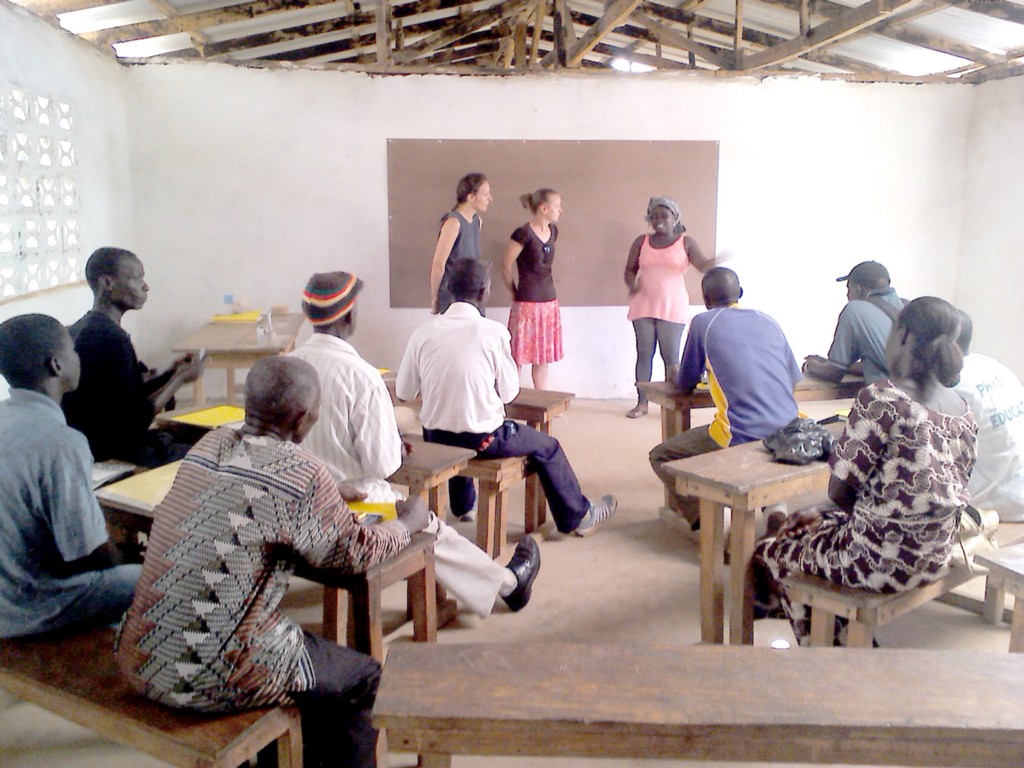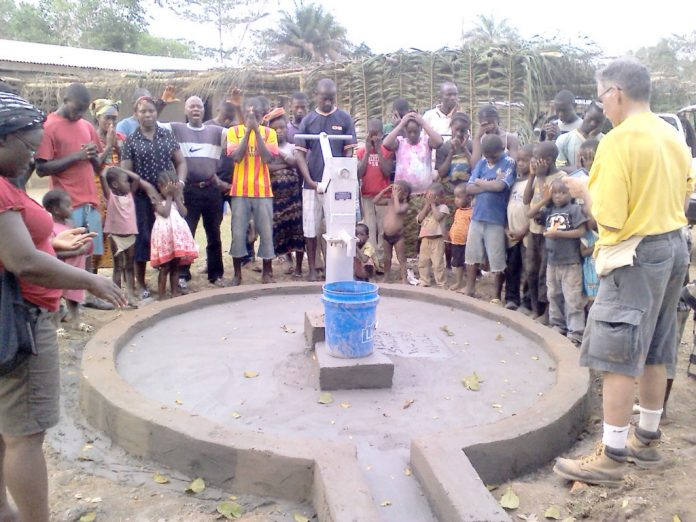Building a future: Somerton United Methodist Church members Dennis Fisher and Jacob Madehdou last winter worked on Ghenwein School, a project the church has been involved with since 2010. The two were in a team of 10 that helped build a sanitation facility and water pump at the school.
Two members of a Somerton church that’s been building a school in Liberia were in the West African country earlier this year, but they were there and back home before the largest ever outbreak of the deadly Ebola virus began this spring.
Somerton United Methodist Church members Dennis Fisher and Jacob Madehdou were in rural central Liberia in January, working on a school the church has been building in the village of Ghenwein since 2010. The two were in a team of 10 that helped build a sanitation facility and a water pump at the school, Madehdou said during an Aug. 6 phone interview.
No one got sick, he said. Fisher said another church member contracted malaria during a 2013 visit to Liberia, but she recovered.
Right now, schools are closed and construction has ceased. But, Fisher said, schools are always closed this time of year.
“They have a schedule just like we do,” he said during a phone interview. Besides, it’s the rainy season now, so construction would be at a standstill anyway.
On Aug. 6, the same day Madehdou and Fisher were interviewed for this story, Liberia’s president, Ellen Johnson Sirleaf, declared a state of emergency in her country because the Ebola outbreak has showed no signs of abating. According to the Associated Press, Sirleaf announced some civil rights may have to be suspended while the country battles the disease.
Almost 300 people have died of Ebola in Liberia.
What the outbreak’s effect on further work at Ghenwein has to be determined. It’s already had an impact. A group of teachers from upstate Pennsylvania was due to arrive in the area in September, Fisher said, to conduct teacher training, but that trip has been scrubbed because of Ebola.
An Ebola outbreak in West Africa is unusual, according to the Associated Press. The disease is more associated with Central Africa, where it was discovered about four decades ago in the Congo near the Ebola River. The current outbreak, now historically the largest, has sickened thousands and has killed more than 800 since March.
Fisher said it began in Guinea, which borders Liberia. According to the World Health Organization, Ebola has spread to Liberia and Sierra Leone.
The disease, which affects victims first with fevers, headaches, sore throats and muscle aches, is treatable but often fatal. Ebola can look like cholera, malaria or typhoid. As patients near death, they begin bleeding internally — and externally through their noses and ears.
The virus, Fisher said, has claimed more victims in Liberia’s capital, Monrovia, where most of the people live. Ebola is spread by human contact. Water jugs for people to use to wash their hands have been set up around Monrovia.
In rural Ghenwein, about 140 miles from the capital, the disease has had no real impact, Fisher said.
The distance does not sound great, Fisher said, but it’s more a matter of time on bad roads that make Ghenwein and Monrovia far apart, a fact that might be hard for Americans to get their heads around. Northeast Philly is a comparable distance from Washington, D.C., but the roughly 150 miles easily can be covered without breaking any laws in about three hours. In Liberia, a country that had been torn by years of civil war, the roads are getting better, Fisher said, but the 140 miles from the capital to Ghenwein takes about eight hours.
That’s better than the 14 hours it used to take, Fisher said.
Ghenwein is on a main road and not cut off from the rest of the country, but Ebola’s impact in the village is indirect, Fisher said. With almost all of the medical professionals dedicated to fighting the outbreak, it’s now difficult for people to get normal or emergency medical treatment.
SCHOOL’S PROGRESS
In 2010, members of the Somerton United Methodist Church began working on the Ghenwein school, and some members of the small Bustleton Avenue congregation have been to Liberia’s rural interior to help with its construction.
Ten classrooms are planned, Madehdou said. So far, six have been completed.
“We are now talking about raising funds to continue,” he said.
The Northeast Times first published a story about the church’s work in Liberia in 2010.
Church members saw their plan to build a school as an opportunity to provide education in the rural area and also as an opportunity to curtail Liberia’s traditional practice of female circumcision, which involves female genital mutilation.
In a 2010 interview, Madehdou said the school project has been a success in that regard. In Liberia countryside, many girls are educated in “bush schools” in which they learn cooking, homemaking and child rearing. Circumcision is performed near the conclusion of that education as a cultural entrance into womanhood, he said.
The Somerton congregation’s hope was that, by providing more formal schooling for girls, young women could avoid the bush schools and circumcision.
When the school’s foundation was laid and a roof was put on four completed classrooms, Madehdou said, “We were able to convince the village elders we were an alternative and they closed their bush school.”
A little money can go a long way at the Ghenwein Mission School, church members have said. Fifteen dollars can buy a school desk. Twelve dollars sponsors a student for a month. Fifty dollars pays a teacher’s salary.
Anyone interested in donating to the church’s mission can visit www.liberiaeducationproject.org and use PayPal, Fisher said. Or they can use the U.S. mail and donate to the Liberia Education Project, care of the Somerton United Methodist Church, 13073 Bustleton Ave., Philadelphia, PA 19116. ••
WHAT IS EBOLA?
According to the World Health Organization, Ebola virus disease (formerly known as Ebola haemorrhagic fever) is a severe, often fatal illness, with a case fatality rate of up to 90 percent. It is one of the world’s most virulent diseases. The infection is transmitted by direct contact with the blood, body fluids and tissues of infected animals or people. Severely ill patients require intensive supportive care. During an outbreak, those at higher risk of infection are health workers, family members and others in close contact with sick people and deceased patients.
The early symptoms of an Ebola infection include fever, headache, muscle aches and sore throat. It can be difficult to distinguish between Ebola and malaria, typhoid fever or cholera. Only in later stages do people with Ebola begin bleeding both internally and externally, often through the nose and ears.
For more information, visit www.who.int/csr/disease/ebola/en

Building a future: Somerton United Methodist Church members Dennis Fisher and Jacob Madehdou last winter worked on Ghenwein School, a project the church has been involved with since 2010. The two were in a team of 10 that helped build a sanitation facility and water pump at the school.





